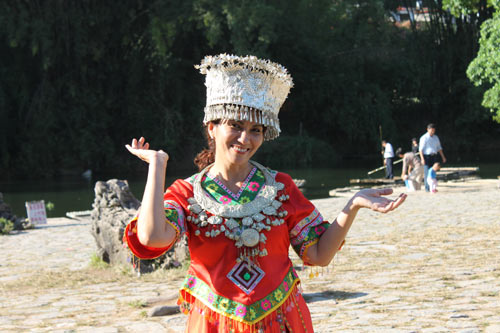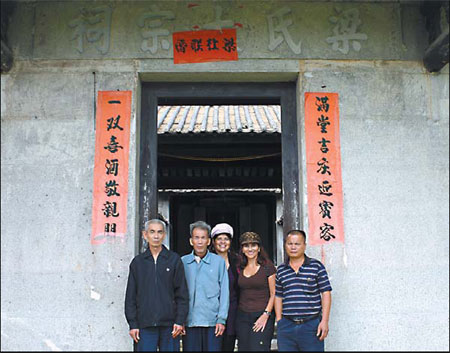Journey unites family after 94 years
Updated: 2012-08-25 07:56
By Wang Jun in Los Angeles (China Daily)
|
||||||||
|
Sol de Leon (second right) and her sister pose for a photo with their extended family members in front of their ancestral temple in Pingshan, Guangdong province. Provided to China Daily |
|
 Sol de Leon, in traditional costume, dances on a river bank during her visit to China. Provided to China Daily |
Sol de Leon, a Panamanian woman now living in the US lights up when recalling the "incredible" meeting with her extended family in China.
Her grandfather Liang Tick Fe left the village of Fa Yen - later renamed Pingshan - on the outskirts of Guangzhou for Panama in 1918 when he was 24, leaving his wife and two sons at home. China was in chaos, ruled by warlords following the overthrow of its last emperor.
Ninety-three years later, his granddaughter De Leon traveled to China for the first time and met with her long lost relatives.
The reunion in October 2011 brought happiness to the different generations of her family living in Panama, the US and China.
De Leon said she always wanted to visit China. With an old document her father had provided - her grandfather's certificate of registration with the Chinese consulate in Panama - de Leon was able to find the village formerly known as Fa Yen.
"I went with my sister on the trip," she said. "I didn't expect to find a family but, only to see the place."
Athena Liang, a college student who is part of the Liang family in Pingshan, recalled the reunion.
"I wasn't at home when they arrived; my mom called me home. I saw everyone was full of excitement," she said. "(De Leon's) grandfather is my great-great-grandfather. The only thing I have heard from the older generations was that he moved to Panama."
De Leon, however, knew what happened after Liang Tick Fe arrived in Central America. Local authorities in Panama registered the new arrival from China as Felix Leon. "When you pronounce Liang, it sounds like 'Leon' in Spanish. So they 'adapted' his name to Spanish," she said.
Leon had an eventful life in his new country. He imported the first convertible cars to Panama and opened a bakery, ultimately prospering and enjoying an affluent life. He became part of what the Panama News called "the biggest of Panama's Chinese fraternal societies" - expatriates from Fa Yen.
But Leon's good fortune didn't last. He fell on hard times, for reasons his granddaughter can only speculate about.
"Somehow my grandfather lost everything and started to struggle. He kept looking for jobs and worked in different cities in Panama and moved very often from place to place."
At the time most Chinese immigrants in Panama were struggling, partly due to strict Chinese-exclusion laws in the Central American nation.
The first Chinese arrived in Panama in the mid-19th century by way of Canada and Jamaica to work on the Panamanian railroad, according to Juan Tam, a historian and writer with the Chinese Association of Panama.
In 1903, the government declared Chinese "undesirable citizens". Ten years later, just before the Panama Canal's completion, a "head tax" was imposed on the Chinese community. The 1941 constitution stripped citizenship from all Panamanians of Asian ancestry.
Arnulfo Arias, Panama's president at the time, ordered Asian immigrants' property to be confiscated. That year, Arias was deposed in a coup, but the persecution didn't end, as Arias' followers forced many Chinese-owned stores to close.
"But they couldn't expel my grandfather because he had a Panamanian wife and children," De Leon said.
Her father, Jaime de Leon, was born in the 1930s, along with two sisters. Along with his Spanish name, he was given a Chinese one - Liang Tai Man.
"My father, Liang Tai Man, took care of his father, Liang Tick Fe, until he died. He lived with us - my father, my mother and I in our apartment," she recalled.
"I was the first grandchild to my grandfather. Every day he used to bring me something to eat, like steamed buns filled with sweet black beans."
De Leon still loves the Chinese snack and cherishes memories of her grandfather.
From kindergarten through high school, she attended a Jewish school on a scholarship. She said she relates to the Jewish diaspora and the overseas Chinese communities and the hardships they suffered.
Starting in the early 20th century, the Chinese played a crucial role in Panama's economy. They are said to have owned more than 600 small businesses, on which the country depended.
According to the English-language Panama News, the Chinese community currently accounts for between 5 percent to more than a third of the Panamanian population.
"There are about 150,000 people in this country who can speak Chinese, who look Chinese and who know something about Chinese culture, but there is a much larger group that has at least some Chinese ancestry," explained Tam, the historian.
New immigrants from China are adding to that number.
People from Pingshan, including two classmates of Athena's, have moved to Panama. Today's immigrants are not leaving China out of desperation, but in search of new experiences and opportunities.
"I may go to live and study in another country for a period of time and experience a different culture when I don't need my parents' support," she said. "Experience is important for our generation."
De Leon received her college education in Mexico. With a bachelor's degree in electrical engineering, she moved back to Panama and worked in the IT industry. Ten years ago she married a US citizen and moved to the United States.
In Guangzhou, she and her sister hired an interpreter, a young woman who spoke Chinese, English and Spanish. They arrived in Pingshan on Oct 3 by motorcycle taxis on a dirt road.
After an hour's search, someone took them to a family temple with the Chinese character "Liang" engraved above the entrance. From the temple, the group was taken to nearby apartments. All of the families had kept genealogical records. Liang Tick Fe was identified from the Liang family tree.
That moment was surreal, de Leon said. A local resident pointed to a man in his 70s and said to her in Chinese: "He's your brother!"
"In Chinese culture, a cousin is a brother or sister," De Leon explained, still feeling the excitement of that moment. Pointing at her 73-year-old cousin in a photo, she observes: "He has my grandfather's forehead". Someone in the Panama branch of the Liang family gathered the whole family - old and young, including De Leon and her sister - and took the group to a village restaurant for a celebratory feast and many photos.
De Leon called her dad in Panama from her hotel room that night. "I could tell my father had tears at the other end of the telephone," she said.
Her father, who turned 80 last year, has started studying Mandarin. He sends video clips of his practice to his children and grandchildren.
Later this month, de Leon and her husband, Dennis Bress, are making another trip to China. Bress has traveled extensively throughout China since the late 1970s on business and pays close attention to news from China.
The couple will be taking de Leon's two children - Paolo, 21, who just graduated from the University of California, Santa Barbara with a major in global studies, and Amy, 19 who finished high school in Southern California and returned to Panama for college two years ago.
"They're very interested in studying the Chinese language," De Leon said. She and the children have been in touch with Athena through QQ, a Chinese Internet conferencing service similar to Skype.
Both Paolo and Amy were recently granted a scholarship from the Chinese government and accepted to Nanjing University. "After our last trip to China, a whole new world has been opened for all of us," de Leon said.
wangjun@chinadailyusa.com
(China Daily 08/25/2012 page6)

 Relief reaches isolated village
Relief reaches isolated village
 Rainfall poses new threats to quake-hit region
Rainfall poses new threats to quake-hit region
 Funerals begin for Boston bombing victims
Funerals begin for Boston bombing victims
 Quake takeaway from China's Air Force
Quake takeaway from China's Air Force
 Obama celebrates young inventors at science fair
Obama celebrates young inventors at science fair
 Earth Day marked around the world
Earth Day marked around the world
 Volunteer team helping students find sense of normalcy
Volunteer team helping students find sense of normalcy
 Ethnic groups quick to join rescue efforts
Ethnic groups quick to join rescue efforts
Most Viewed
Editor's Picks

|

|

|

|

|

|
Today's Top News
Health new priority for quake zone
Xi meets US top military officer
Japan's boats driven out of Diaoyu
China mulls online shopping legislation
Bird flu death toll rises to 22
Putin appoints new ambassador to China
Japanese ships blocked from Diaoyu Islands
Inspired by Guan, more Chinese pick up golf
US Weekly

|

|







